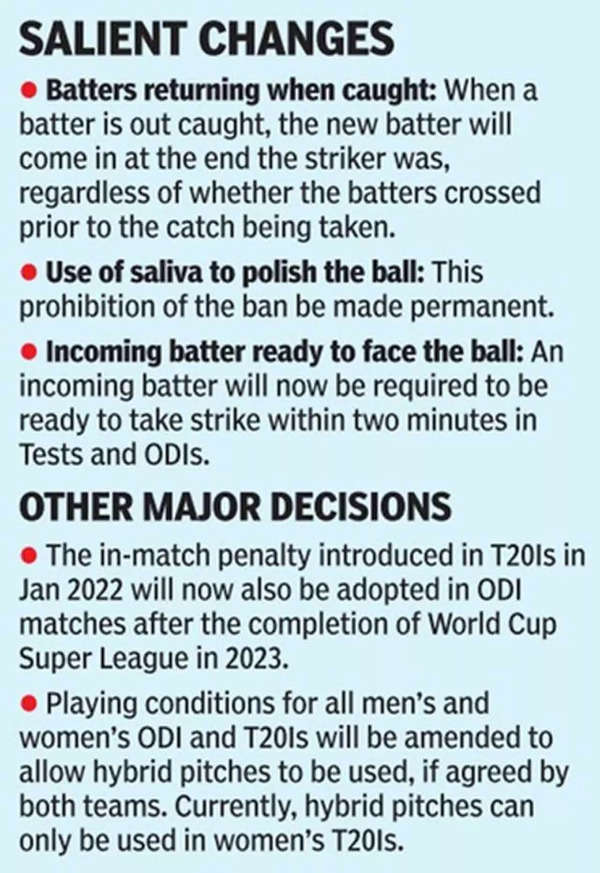ICC lays ‘Mankading’ to rest | Cricket News – Times of India
NEW DELHI: The International Cricket Council‘s (ICC) chief executives’ committee has ratified a slew of changes to the playing conditions which will come into effect from October 1, the most prominent among them being a belated attempt to destigmatize the controversial practice of ‘Mankading’, or running out a batter at the non-striker’s end.
For decades, the move, which takes its name from the legendary Vinoo Mankad’s similar run out of Bill Brown during India’s 1948 tour of Australia, has been considered against the ‘spirit of the game’ even though it is perfectly legal according to cricket’s laws.

Now, as recommended by the Sourav Ganguly-chaired ICC cricket committee, the running out of the non-striker has been moved from the ‘unfair play’ section to lend it more legitimacy. “The playing conditions follow the laws in moving this method of effecting a run out from the ‘unfair play’ section to the ‘run out’ section,” the ICC said.
The likes of former Indian captain Sunil Gavaskar have long protested against the mode of dismissal being named after a prominent Indian cricketer. It was, however, Ravichandran Ashwin’s more recent run out of non-striker Jos Buttler, in the 2019 IPL, which created a huge stir and may have prompted the recent change.
Technically, this mode of run-out was always there. But it was rarely employed because a culture was created against it. The runner trying to get an unfair head start was projected as the victim and the bowler pilloried. In the past, Vinoo Mankad and R Ashwin received the rough end of the stick for doing what was entirely legal. ICC’s decision, a rare bowler-friendly move, takes the stigma out of those attempting a run-out in this manner. Functionally, it will force non-strikers to stay in the crease. At a time when T20 is becoming the most played format of the game and last over finishes are common, every inch counts.
The criticism of Ashwin‘s act by some prominent English cricketers, and the off-spinner’s subsequent trolling on social media, again highlighted how the bowler always took the stick for ‘Mankading’ while letting the batter essentially go scot free for being out of his ground. Other significant changes by the committee which were ratified include a permanent ban on the use of saliva, which has already been in effect since the onset of the Covid-19 pandemic. Whether a more permanent law will lead to the complete erasure of reverse swing as a potent force in the game remains to be seen.
Also, the method of batters ‘crossing’ over during a caught-out dismissal has been done away with. “Now, when a batter is out caught, the new batter will come in at the end the striker is, regardless of whether the batters crossed prior to the catch being taken,” the ICC said. This is likely to help the bowling team, especially in crunch situations in which a less established batter is likely to come in.
Another important new feature in the game will be the awarding of 5 penalty runs and a dead ball to the batting side should there be any unfair and deliberate movement from a fielder while a bowler is running in to bowl.
Also, if both teams agree, hybrid pitches, currently allowed only in women’s T20Is, can now be used in men’s T20Is and ODIs too. A hybrid pitch is a blend of natural grass and artificial fibres.
For all the latest Sports News Click Here
For the latest news and updates, follow us on Google News.

